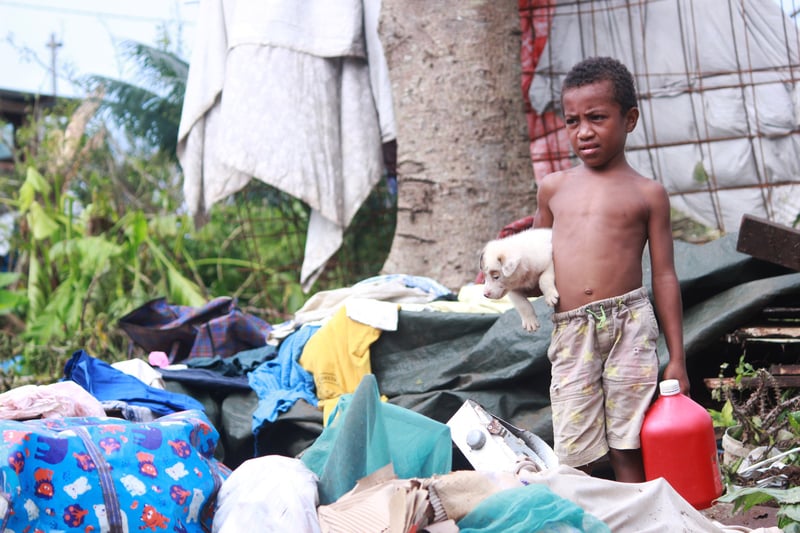
Cyclone Pam: One of the worst storms in Pacific history
News
Help is on the way for animals suffering after Cyclone Pam
A team of our disaster response vets are on their way to Vanuatu, to help animals who've been injured or left without shelter, after Cyclone Pam has left the South Pacific island nation devastated.
Prior to the storm, we contacted radio stations and newspapers across Vanuatu, Solomon Islands, Fiji, Tuvalu and New Zealand with emergency preparedness tips for animal owners. The storm affected them all, with Vanuatu reportedly the worst affected. These messages help people prepare themselves and their animals in advance of a storm, giving them a better chance of survival.
As the extent of the animal and human needs becomes clear, we are joining the international effort and will immediately begin helping animals once we are on the ground. Our work will complement the humanitarian relief, and with two-thirds of people in Vanuatu making a living from agriculture, our work to protect their animals will help protect their future livelihoods.
It has only been a year since World Animal Protection was last in Vanuatu, in the aftermath of Cyclone Lusi. Our realization then was that there was no infrastructure to get veterinary care to animals. We subsequently provided veterinary kits to each of the six provinces in Vanuatu, to improve the island’s ability to help animals in future disasters. Cyclone Pam will be the first time that is put to the test.
While disaster response rightly prioritizes people’s immediate needs, their long-term recovery from disasters is inextricably linked with the well-being of their animals. After a storm like Cyclone Pam, it will inevitably take time to help rebuild the lives of the communities across Vanuatu, but by helping their animals, we can help provide some stability for their futures.
Ways that we will be assisting:
- Immediately assisting animals on the ground injured from the cyclone and meeting basic needs for survival.
- Assessing the wider and longer-term needs of the animals in partnership with the government.
- Running a mobile clinic first in the Port Vila area and then as areas open up, in the more heavily affected Southern islands to provide support to animals and their owners.
James Sawyer, our International Director of Disaster Management, says:
“In a disaster of this magnitude, we anticipate animals will have a range of needs such as emergency veterinary care, emergency feed, shelter -- what you normally see in severe wind and water disasters. We're on the way now to help where the animal need is greatest and will update you from Vanuatu.”
Mike Baker, our Chief Executive, says:
“Cyclone Pam has utterly devastated the communities of Vanuatu. We know from experience that animals will be in dire need, injured, starving, open to the elements, and at high risk of disease–they need our help. Helping these animals will also help the people who rely so heavily on them for their livelihoods, transport, and food. Protecting the animals will be an integral part of Vanuatu’s recovery, and that is what we are there to do.”